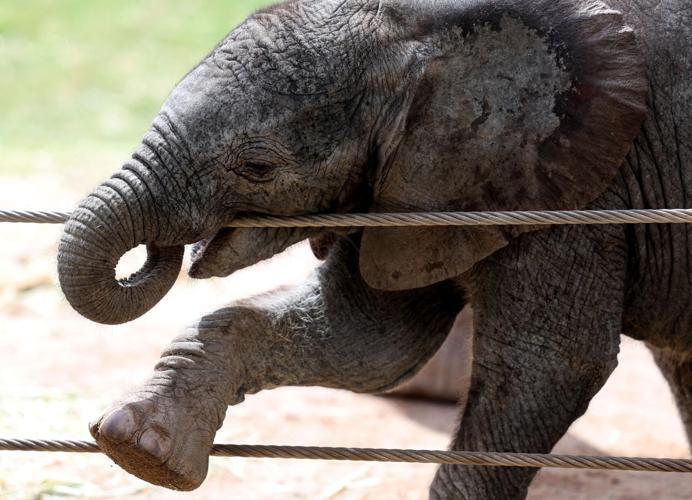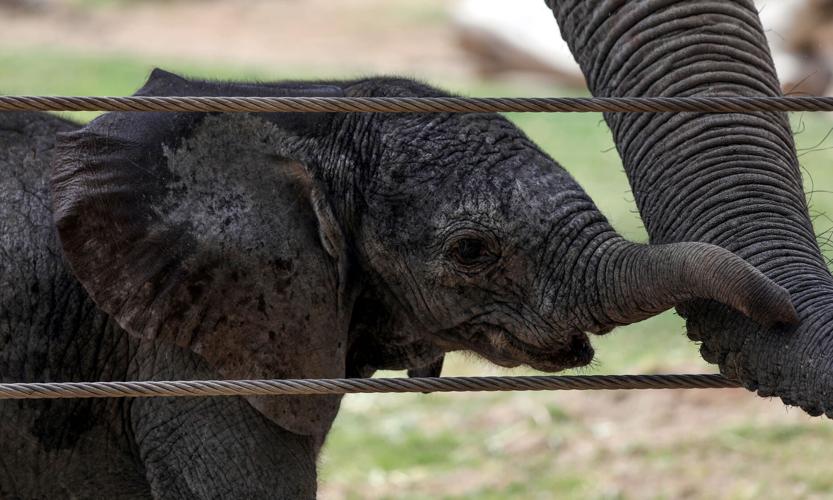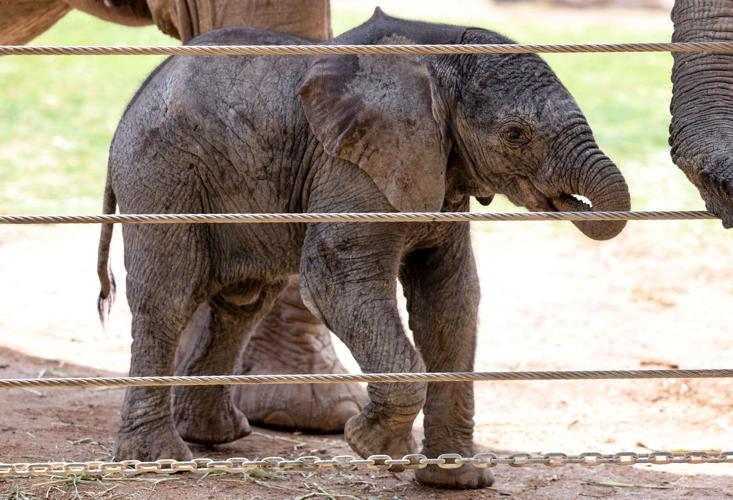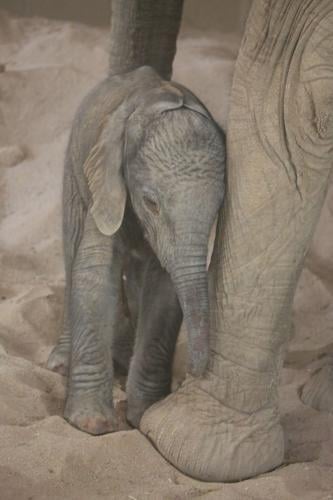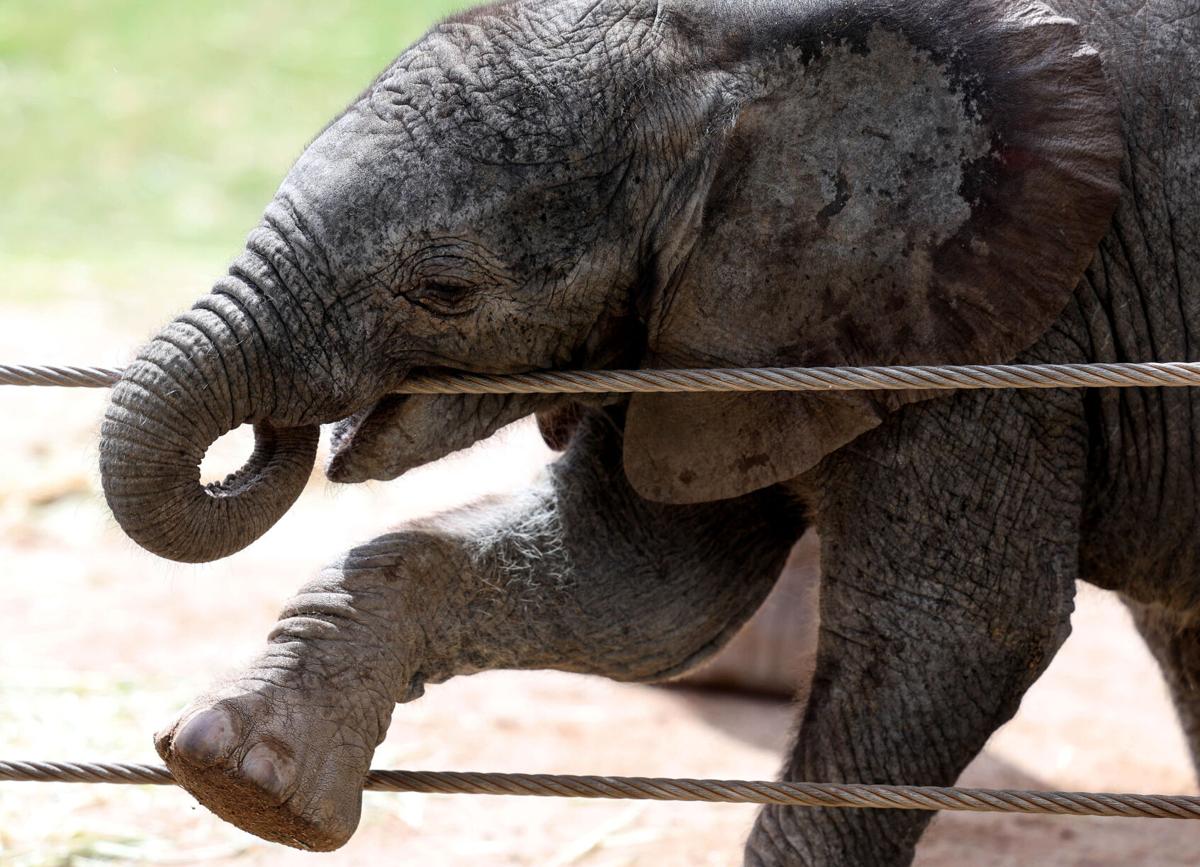The day before, Semba had a change in her appetite and started to become more and more uncomfortable.
Around 3 a.m. March 8, the 32-year-old African elephant went into labor at Reid Park Zoo. Merely 30 minutes later, an adorable baby was born. The calf has yet to be named, but staff are dabbling with a few ideas.
The 266-pound female calf has hit all her milestones so far — it took her about 20 minutes to stand up and only a couple hours until she was successfully nursing. In the first few hours, calves tend to stumble a lot and don't really know how to move backwards. By Day 3, they start to learn how to spin and pivot their bodies.
"She doesn't quite understand gravity. She'll stumble forward when going downhill," elephant supervisor Cassie Dodds says. "Baby elephants are really good at falling. They spend a lot of time rolling around on the ground."
Through breeding observations, ultrasounds, bloodwork and urine analysis, keepers found out about Semba's pregnancy nearly two years ago — yes, that's about how long an elephant's pregnancy lasts.
"The elephant community has a species survival plan in place," Dodds says. "They look at the genetics of all the elephants — elephants are on a decline in their numbers in zoos and in the wild. They put together numbers of which animals should be reproducing and when."

The newest member of Reid Park Zoo’s elephant herd walks with her mother Semba.
While pregnant, Semba receives around-the-clock care, what the zoo lovingly calls birth watch. This time around, the 24/7 watch started months sooner than normal, after vets noticed that Semba's hormone levels were inconsistent. Though Semba and the baby are healthy, keepers kept an extra eye on her during this pregnancy.
During birth watch, docents track Semba's every move, recording observations every five minutes. They look at her comfort levels, how well she's eating and how much effort she's putting into foraging.
Staff members provided extra hydration for Semba during the pregnancy and in the event of any changes in bloodwork, they were able to provide her with probiotics or antibiotics. They made fluffy sand pillows for her so she'd have comfy spots to lay down, and she'd get the hot spots in the barn during our cold nights.
Keepers also hung up elevated feeding tools, like tall hay nets and her favorite snacks intertwined into a firehose, so she'd have to stretch and increase her core strength in preparation for labor.
"We also gave her a lot of social time with her daughters so she wasn't isolated," Dodds says.

Reid Park Zoo’s baby elephant is now one week old and has hit all her milestones so far.
From a family of four to a family of five
In 2014, Semba gave birth to Nandi, the first elephant born in Arizona, taking the city by storm and breaking attendance records at Reid Park Zoo, 3400 E. Zoo Court. In 2020, Penzi was born in the height of the COVID-19 pandemic.
Dodds has been around for all three pregnancies.
"It's amazing. She's such a great mom," Dodds says. "I have really seen her become more confident with each daughter she's had. Her earlier pregnancies, she had little boys, so now having daughters has given her a lot more support because they're really involved in raising the calf. Nandi is taking a front-and-center role and helping her mom."
Semba has been at Reid Park Zoo since 2012 after coming to Tucson from San Diego Zoo's Safari Park, where her sons are. Male elephants tend to be with their mothers and family groups until they're reproductively mature. They then move to other herds. Females typically stay together, building communities and teaching one another.
Mabu, who left Reid Park Zoo in 2022, is the dad to Nandi, Penzi and the newest baby. “In the wild, male elephants commonly move between herds for social and breeding purposes. Mimicking this natural behavior, Reid Park Zoo’s bull elephant Mabu has a new home at Fresno Chaffee Zoo,” Reid Park Zoo said in 2022.

It might be a couple more weeks before the elephant calf is on the main part of the habitat, but keepers are ready. The pools are drained, the hills have soft landings and the area is baby-proofed.
This newest baby expands Reid Park Zoo's herd to five, which also includes allomother Lungile. Penzi and Nandi were both there when Semba gave birth. Lungile was around the baby very early on.
"Herd births give the younger elephants the opportunity to learn and see how to care for the young calf," Dodds says.
When Penzi was born, Nandi was 5½ years old — old enough to know she was a protector but too young to really know how.
"This time, Nandi has learned the ropes with Penzi. She's taken on more of a nurturing role," Dodds says. "She'll take her trunk and bring the calf to her, she'll take the calf between all four legs, she warns her sister away from the baby if she feels her sister is too close."
Penzi isn't quite there yet.
"Penzi will approach the baby backwards and be a few feet from the baby, but she mostly gives her space. We have some footage we caught yesterday of the baby running toward Penzi and Penzi starts running backwards."
Penzi, who is 4 years old, isn't quite old enough to take on that nurturing trait just yet, but Dodds expects that to change around age 5.
"I think she still has the mentality of being a calf," Dodds says, adding that she thinks Penzi will soon realize how exciting it will be to have a new sibling to play with.

This photo was taken the day the elephant calf was born, March 8.
"Lungile has also been wonderful with making sure Penzi feels like she has support right now because Penzi has always gone to her mom," Dodds says. "But now she's going to Lungile because Mom has the scary baby."
"My favorite part about working with (the elephants) is how they’re all socializing with the calf and the experiences they’re having together right now is just really fun to watch," Dodds says.
It might be a couple more weeks before the baby is on the main part of the habitat, but keepers are ready. The pools are drained, the hills have soft landings and the area is baby-proofed.
"Having had some elephants born here, we can really share that experience with the community and have it be something that everybody in the community can experience," Dodds says.
Watch Reid Park Zoo's week-old elephant calf explore her habitat. Video courtesy Reid Park Zoo


